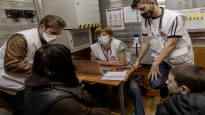Health care in Ukraine is under severe pressure. Doctors Without Borders is one of the actors in identifying the acute needs of hospitals and also the need for local mental support.
Russia’s hostilities in Ukraine are a huge crisis for Ukraine’s health care, even with regard to its underlying diseases.
As many as a third of Ukrainians with chronic illnesses do not receive adequate medication or treatment in the midst of war, according to a report published by the World Health Organization in late April.
The situation is also reflected in the work of Doctors Without Borders.
In Zhytomyr, for example, there was a shortage of medicines for diabetes, hypertension and asthma, among others, when an anesthetist Cariant Rock was on behalf of the organization in Ukraine in April.
Kallio toured most of the hospitals in eastern Ukraine and surveyed what kind of supplies or training Ukrainian doctors needed.
The main emphasis was on supplies needed to treat war injuries, but a shortage of medicines also emerged.
– There is a growing need in the East for medicines for basic diseases. In the Donetsk region, people have been instructed to leave, but the elderly, the mentally handicapped and those suffering from basic diseases have not been able to leave.
The situation also makes it more difficult to treat more serious illnesses, even if, for example, cancer patients continue to be treated in the middle of a war.
A Kiev-based cancer doctor estimates that 15 to 20 percent of Ukrainian cancer patients have had to stop treatment because of the war. The Russian bombings have also destroyed cancer clinics in Mariupol and Kharkov.
Patients with tuberculosis in Zhytomyr received the medication for a month
Many people export medicines and medical supplies to Ukraine.
For example, the World Health Organization (WHO) and its partners have supplied the country with medicines and healthcare equipment for the needs of some 7.5 million people.
There is a need for assistance, even though Ukraine has received large amounts of it. In a Twitter update, the country’s health ministry listed, among other things, 130 million drug packages and thousands of medical supplies.
Doctors Without Borders has 50 years of experience operating in a crisis area.
They have a central warehouse from which goods have been transferred to the main warehouse in Ukraine. From there, the necessary medicine deliveries will be arranged to the right hospitals in a few days.
– We know how to take supplies to crisis areas. Now normal transport chains do not work when companies do not dare to deliver medicines or supplies to their destination, says Finnish Executive Director of Doctors Without Borders Linda Konate.
The International Medical Association has been operating in Ukraine since 1999. It has been working with the Ukrainian Ministry of Health on tuberculosis, hepatitis C and HIV since the war.
The organization’s tuberculosis work focuses on Zhytomyr.
– When the war broke out, tuberculosis patients were given medication for a month. Now the patients have been on their own, says Konate.
The organization is currently tracking these tuberculosis patients with the Department of Health to ensure their treatment.
The problem in Ukraine and elsewhere in Eastern Europe is that drug-resistant forms of tuberculosis are common. There are approximately 20,000 cases of tuberculosis reported each year, but cramped accommodation and transportation in crisis situations increase the risk of the disease spreading.
About 260,000 Ukrainians are infected with HIV. For them, the U.S. AIDS Emergency Program and the WHO have provided medication for 12 months. Without effective medication, an HIV patient has 30-fold risk (switch to another service) develop tuberculosis.
Mental support is an important part of the activities of a medical association
In addition to material assistance, psychological assistance is also needed in Ukraine. Chat help is provided at mobile clinics, among other places.
Doctors without borders have been in Eastern Ukraine since 2014 to support mental health services.
– It is an important part of our operations. We treat basic diseases, but at the same time we see a lot of mental health-related symptoms, which we also try to support in that situation, says Linda Konate.
The need for spiritual assistance in Ukraine will continue to grow. People live in awkward conditions in basements and subway stations. At the same time, Ukrainians are shocked by the brutality of Russian forces and sexual violence in the occupied territories, about which not all Ukrainian victims are yet able to even speak.
Kariantti Kallio, who returned from Ukraine a week ago, says that spiritual support and compassion are also needed from other people, so that people in the middle of a war are not forgotten, even if the crisis stagnates.
– It makes sense to give money to aid organizations, as they identify current needs on the ground. The need can change quickly.
